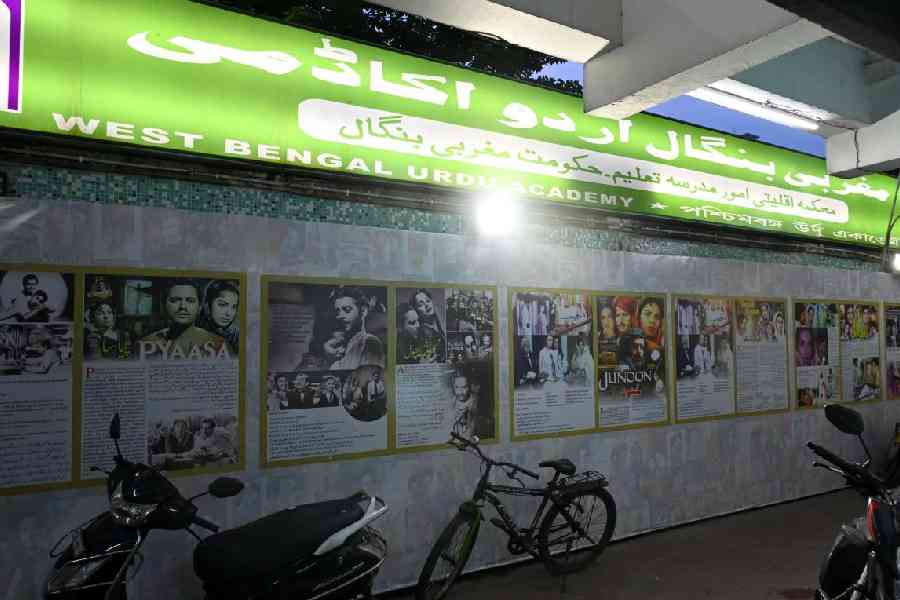A four-day programme celebrating the role of Urdu in Hindi cinema has been abruptly postponed, allegedly due to objections from two Islamic organisations over the invitation extended to renowned poet and lyricist Javed Akhtar, a self-declared atheist known for his criticism of organised religion.
The event, titled Hindi Filmon Mein Urdu ka Kirdar (The Role of Urdu in Hindi Films), was scheduled to be hosted by the West Bengal Urdu Academy from August 31 to September 3, with events planned at the academy’s office on Rafi Ahmed Kidwai Road and at Kala Mandir. Akhtar was slated to attend a programme at Kala Mandir on Monday.
On Saturday, academy secretary Nuzhat Zainab issued a statement: “Due to unavoidable circumstances, the four-day programme of the West Bengal Urdu Academy, scheduled on August 31 to September 3, is being postponed.”
When a reporter from an Urdu news portal prodded her for a reason, Zainab said: “As I said, due to unavoidable circumstances.”
Jamiat Ulema Kolkata — the city branch of the national Islamic organisation Jamiat Ulama-i-Hind — and the Wahyain Foundation objected to the invitation to Akhtar.
In a letter to Mohammad Nadimul Haque, Trinamool MP and vice-chairman of the academy, the Jamiat said the invite to Akhtar was a “matter of great concern”, calling him “a person who is not only averse to religion but also adamant about insulting people of other religions.” It said that a “deserving person be invited in his place, regardless of his religion.”
The protest was endorsed by Siddiqullah Chowdhury, Bengal cabinet minister and state president of the Jamiat. If the request is not heeded, the letter warns of protests similar to the “movement against Taslima Nasreen”.
Nasreen, known for her writings against communalism and for women’s rights in Bangladesh, was forced to leave Calcutta in 2007 following violent street protests.
Calls and messages to both Haque and Chowdhury went unanswered.
Abdus Salam, general secretary of the Jamiat’s Bengal unit, told Metro: “We have no problem with the said person being an atheist. But he has made disparaging remarks on religion on several occasions, from several platforms. We are opposed to that.”
Akhtar has been consistently critical of organised religion and vocal about promoting scientific temper. Many of his comments, particularly those challenging blind faith, are popular on social media.
The organisers said the postponement was unfortunate and ironic because the event was meant to celebrate the syncretic nature of Urdu.
The programme was to include film screenings, seminars, discussions, and a mushaira. Posters of classics like Mughal-E-Azam, Pyaasa, Kagaz Ke Phool, and Umrao Jaan adorned the patio of the academy on Monday, while a large banner featuring Akhtar remained displayed outside.
Ghazala Yasmin, professor at Aliah University and member of the academy’s governing body, said: “The current religious otherisation has pushed Urdu to the margins. But Urdu is a secular language if there ever was one. It is as Indian as Bengali or any other Indian language. The programme was meant to highlight this syncretic identity of Urdu.”
Maidul Islam, political scientist, said the postponement was likely the result of “electoral compulsions” and added: “It sends out a wrong message to the larger public. It is a setback for liberal ethos.” The Bengal Assembly polls are due next year.
Sabir Ahamed, who leads a ‘Know Your Neighbour’ campaign to promote more interaction between communities and citizens, said the decision “only strengthens the politics of communalisation.”
Akhtar is a regular at literary meets, including those in Calcutta. At a similar event in March 2022, he had spoken about the origins of Urdu, stressing its non-conformist and egalitarian character.
“I am proud of one unusual fact about Urdu. All poetry in any language starts from temples, churches, scriptures and praise to gods and religion. It then transcends towards other topics — first romance, then, much later, socio-politics etc. Urdu is an exception. When Urdu poetry started, it was agnostic, atheist, anti-fundamentalism, and anti-superstition,” Akhtar had said.











